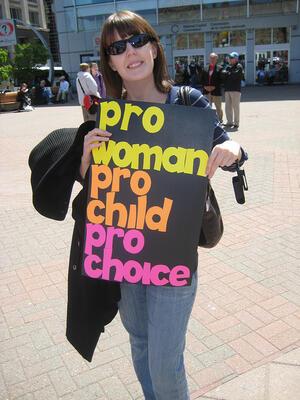Link Roundup: Remembering Roe v. Wade
Ottawa Pro Choice Presence at the 2010 National March for Life.
Photo by Jenn Farr via Flickr
Marking the 39th anniversary of Roe v. Wade approaches on January 22nd, National Council of Jewish Women CEO Nancy K. Kaufman explained why women should continue to “guard against efforts to roll back choice.” The Guttmacher Institute reported that in 2011 individual states introduced more than 1,100 anti-choice proposals, 135 of which were enacted in 36 states. [The Forward]
On Friday, the Obama administration rejected requests made by the U. S. Conference of Catholic Bishops to exempt religiously affiliated employers from the Affordable Care Act’s requirement to cover the full cost of contraception in employer-sponsored insurance plan. Religiously affiliated institutions that currently do not cover contraception will have until August 2013 to do so, while houses of worship will remain exempt from the new law. [Ms. Magazine]
In a bold move, the Israel Medical Association (IMA) barred its members from attending the PUAH Institute’s annual fertility and halacha conference because the event excluded female speakers. The PUAH Institute responded to the boycott by announcing its plans to host a women-only conference over the summer, leading author Elana Sztokman to criticize the organization inadequate “separate but equal” solution. [Jerusalem Post] & [The Sisterhood]
In an Op-Ed (in a decidedly secular newspaper), Rabbi Dov Linzer revealed that according to the Talmud, it is up to men to control their own sexual urges, as opposed to forcing women to dress modestly. Linzer added, “At heart, we are talking about a blame-the-victim mentality. It shifts the responsibility of managing a man’s sexual urges from himself to every woman he may or may not encounter.” [NY Times]
Female Torah scribe Hanna Klebansky shared how she uses her work to combat gender segregation in Israel. [Haaretz]
This link roundup was originally posted on the Lilith blog. For more coverage on the latest news stories, follow Lilith Magazine on Twitter at @LilithMagazine.







Thanks for the roundup of threats to reproductive rights in US and Israel. It disturbs me greatly that the knowledge of family planning and contraception that my mother was so proud to have acquired and practiced in the 1930's, that she passed on to me and that I in turn passed on to my daughter and son, need our constant attention and protection. Again and again, experience and scientific studies show that women [and sometimes men] who have access to family planning information and safe, affordable contraception choose to space out their pregnancies and limit the number of their children, so that they can feed, protect and educate their families more adequately. Let's protect the right to family planning information and contraception for all women everywhere.